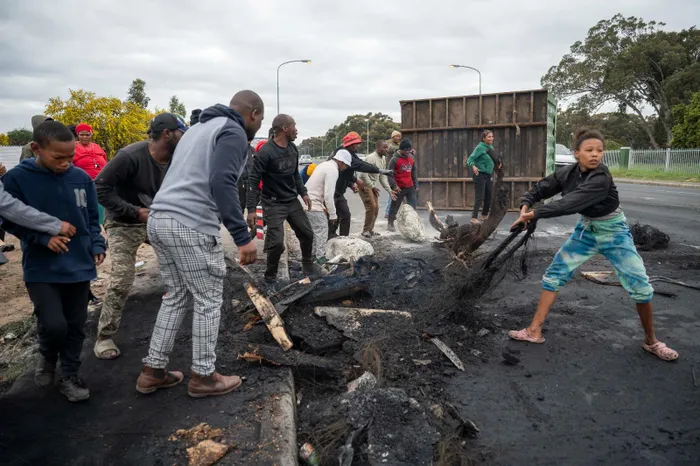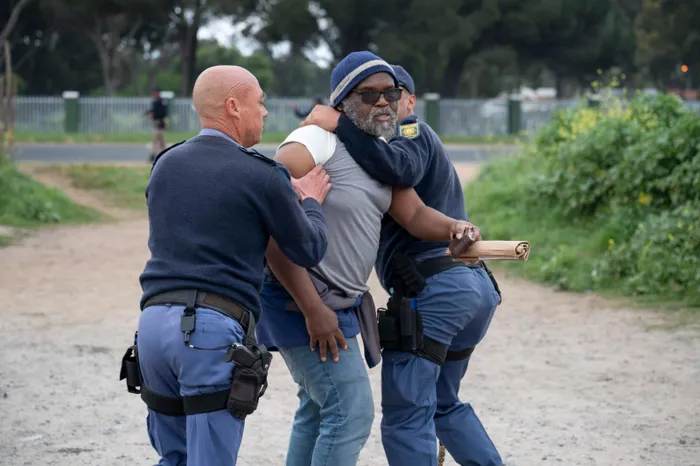Cape Town's water crisis: Community protests highlight neglect of the poor

The community of Gate 7 informal settlement protests over the lack of service delivery and disrupts traffic flow on Voortrekker Road between Jake’s Gerwel Drive and 18th Avenue in Factreton
Image: Armand Hough / Independent Newspapers
The community of Gate 7 informal settlement near Wingfield Navy base in Cape Town said the City of Cape Town neglected the community of about 50 families, subjecting them to the lack of adequate sanitation and access to electricity.
"We are protesting after many, many disappointments. This is not the first time we have written letters, we have been to the councillor, we've been to the mayor, they know about these communities very well, yet they don't want to deliver basic services and dignity," community activist Phillip Nyalungu said.
"These are basic human rights, enshrined in the Bill of rights, that everyone must have access to water, because that is life, and everyone has the right to life."
On Monday, protesters blocked Voortrekker Road with a shipping container and burned tyres, which caused major traffic disruptions during a protest where they were demanding the installation of basic infrastructure in their area.
Nyalungu said that the City undermined the rights of the people living in the area.
"The people who wrote the Constitution were thinking properly; they were not mad. However, what this government is doing violates that; they are deliberately killing the poor Black people," Nyalungu said.
They want to protect the interests of the rich; they are telling us that they cannot deliver services because we are on private land. This is a strategy to get the rich to occupy this land."

The police taking away community activist Phillip Nyalungu during a service delivery influenced protest
Image: Armand Hough / Independent Newspapers
City of Cape Town spokesperson, Luthando Tyhalibongo said they are aware of the protest, the conditions that gave birth to it and further said they would look into the matter.
"The settlements are located on privately-owned land, which, as per previous engagements, limit the City’s legally allowed interventions," Tyhalibongo said.
"The City has an open-door policy to discuss matters of concern and to see if there are any feasible, lawful solutions or options to ease the plight of vulnerable residents in particular."
Tyhalibongo said the residents are on private land, which limits the city's legally allowed interventions, and indicated that there is a plan to help the struggling communities.
"The City has a planned and systematic approach to service delivery and housing due to the acute demand and the finite resources, as well as the legislation applicable," Tyhalibongo said.
"The City acknowledges the right to protest, but in a peaceful manner and where actions do not negatively impact other members of the public."
Dr Ferrial Adam from WaterCan said the protest showed that South Africa’s water crisis was national, hitting hardest in informal settlements and among the unhoused.
"Communities live without clean water because of government’s poor planning, collapsing infrastructure, and failure to provide decent housing. Instead of fixing this, leaders criminalise the poor, treating people in struggle as the problem," Adam said.
"The real crime is a government that lets taps run dry and families live without dignity. Water and housing are not favours – they are rights, and no one should have to fight this hard just to survive."
This protest followed an eventful week of service delivery influenced by protests, particularly the persistent issue of water shortages across the City of Johannesburg.
The government has previously been accused of not having the political will to attend to the basic needs and rights of ordinary citizens.
With the expansion of residential and business areas, Tyhalibongo said the City was not able to keep up in terms of resources.
"It must be noted that the City has plans to spend approximately R8.4 billion to deliver human settlements opportunities and the enhancement of service delivery in informal settlement areas, across the metro over the next three years," Tyhalibongo said.
"All interventions in terms of service delivery are in terms of available resources and within the parameters of what is legally allowed," he said.
"Numerous communities are demanding services, but currently the City is unable to cater for these unplanned settlements as existing recognised informal settlements are prioritised based on available resources, which are not limitless."
Cape Times